Monthly Archives: November 2019
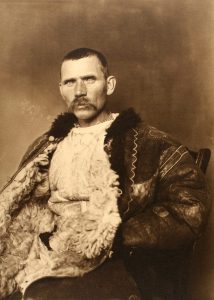
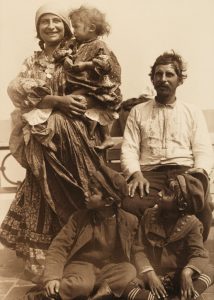
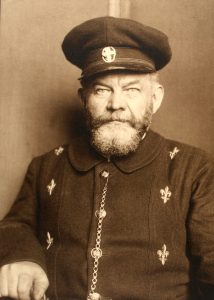 The United States has long been known as “The Melting Pot,” in reference to the immigration of many of its citizens. The United States was not a country that began with all of its people in place. I suppose no nation was really. There is, however, a legal way to immigrate, and an illegal way to sneak into a country. For the purpose of this story, the melting pot refers only to legal immigration. Beginning in 1892, and continuing until 1924, Ellis Island, located in New York Harbor, was the entrance for immigrants entering the United States. Not everyone who entered the United States had to go through Ellis Island, however. First and Second Class passengers were not so required. They were allowed to do all of their immigration paperwork, and inspections onboard the ship that arrived on. The Third Class passengers, however, were required to go through Ellis Island. There, they had medical exams and legal inspections to determine if they were fit for entry into the United States.
The United States has long been known as “The Melting Pot,” in reference to the immigration of many of its citizens. The United States was not a country that began with all of its people in place. I suppose no nation was really. There is, however, a legal way to immigrate, and an illegal way to sneak into a country. For the purpose of this story, the melting pot refers only to legal immigration. Beginning in 1892, and continuing until 1924, Ellis Island, located in New York Harbor, was the entrance for immigrants entering the United States. Not everyone who entered the United States had to go through Ellis Island, however. First and Second Class passengers were not so required. They were allowed to do all of their immigration paperwork, and inspections onboard the ship that arrived on. The Third Class passengers, however, were required to go through Ellis Island. There, they had medical exams and legal inspections to determine if they were fit for entry into the United States.
It is estimated that 12 million immigrants came through Ellis Island in those years. In all, about 2% were denied entrance into the United States. Our nation was quite generous with its legal immigration requests. One 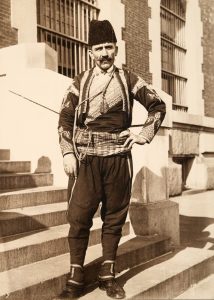
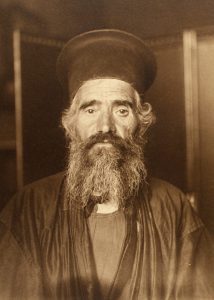 of the main reasons for the opening of Ellis Island was the change in the immigration requests. “Fewer arrivals were coming from northern and western Europe—Germany, Ireland, Britain and the Scandinavian countries—as more and more immigrants poured in from southern and eastern Europe. Among this new generation were Jews escaping from political and economic oppression in czarist Russia and eastern Europe (some 484,000 arrived in 1910 alone) and Italians escaping poverty in their country. There were also Poles, Hungarians, Czechs, Serbs, Slovaks and Greeks, along with non-Europeans from Syria, Turkey and Armenia. The reasons they left their homes in the Old World included war, drought, famine and religious persecution, and all had hopes for greater opportunity in the New World.”
of the main reasons for the opening of Ellis Island was the change in the immigration requests. “Fewer arrivals were coming from northern and western Europe—Germany, Ireland, Britain and the Scandinavian countries—as more and more immigrants poured in from southern and eastern Europe. Among this new generation were Jews escaping from political and economic oppression in czarist Russia and eastern Europe (some 484,000 arrived in 1910 alone) and Italians escaping poverty in their country. There were also Poles, Hungarians, Czechs, Serbs, Slovaks and Greeks, along with non-Europeans from Syria, Turkey and Armenia. The reasons they left their homes in the Old World included war, drought, famine and religious persecution, and all had hopes for greater opportunity in the New World.”
At one point, one of the men working on Ellis Island decided to bring his camera, and document the variety of people coming through. His photos really do show the “melting pot” that the United States was. He photographed a Romanian shepherd, a Serbian gypsy family, Danish captain, a bearded Greek priest, a Turkish bank guard, an Albanian soldier, an Algerian (wearing his finest clothes), and a tattooed German stowaway (who was eventually deported). It gives an inside look at the varied people who came to the United States, 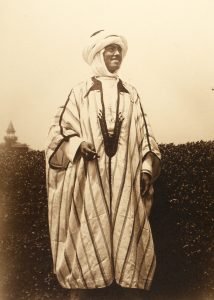
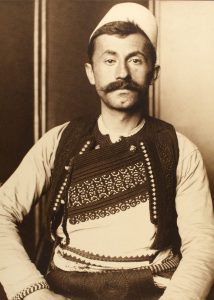
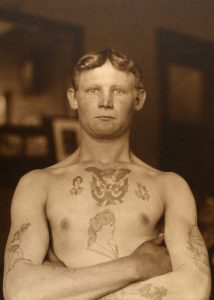 and these were just the third class passengers, seen on Ellis Island.
and these were just the third class passengers, seen on Ellis Island.
Ellis Island was used as an immigration center until 1924, at which time it was used until 1954 as a detention and deportation center for illegal immigrants. Now it is a museum, and a place where people can go to see if their ancestors came through on their way to a better life. The island had a varied past, and played a major role in creating “The Melting Pot” the United States was.
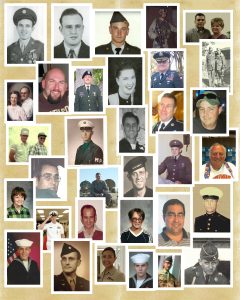 Unfortunately, we don’t live in a world without wars, so our soldiers are a vital part of our national security. Of course, we hope and pray that all of our soldiers will eventually come home from war, be discharged from military service, and become veterans. Sadly that is not always the case. For those who do not come home, we have Memorial Day, to honor their memory. Veteran’s Day, however, is a day to honor those who served, and then came home and went back to their lives. For those who are veterans, we take this opportunity to thank them for their service and their sacrifice, because they did sacrifice. They left their families at home, and went out to fight for people they don’t even know, and probably never will. We, here at home, have no way to really repay them for their acts of selflessness, so all we can do is thank them for their service. Somehow, it just doesn’t seem enough. How could we possibly repay them? We can never give them back the lost time with family, the memories, the births of children, and the multiple firsts that go with them. Those things are gone forever for the soldier, because they chose to go out and protect their country, and the people in it.
Unfortunately, we don’t live in a world without wars, so our soldiers are a vital part of our national security. Of course, we hope and pray that all of our soldiers will eventually come home from war, be discharged from military service, and become veterans. Sadly that is not always the case. For those who do not come home, we have Memorial Day, to honor their memory. Veteran’s Day, however, is a day to honor those who served, and then came home and went back to their lives. For those who are veterans, we take this opportunity to thank them for their service and their sacrifice, because they did sacrifice. They left their families at home, and went out to fight for people they don’t even know, and probably never will. We, here at home, have no way to really repay them for their acts of selflessness, so all we can do is thank them for their service. Somehow, it just doesn’t seem enough. How could we possibly repay them? We can never give them back the lost time with family, the memories, the births of children, and the multiple firsts that go with them. Those things are gone forever for the soldier, because they chose to go out and protect their country, and the people in it.
Our soldiers are an amazing group of people…the best in the world. They have blessed the people of this nation in so many ways. Their service goes beyond just fighting a war. They show kindness to the people in war ravaged countries, sometimes risking their own lives to do so. The biggest problems with civilians in war zones,  is that you never truly know if the people you meet need help, or if they are out to kill you. Nevertheless, our soldiers set aside the worries and fears, and go out to do their duty. That is what makes us proud. We wish it was unnecessary for them to go, but we are thankful when they do, because we know that we are safer.
is that you never truly know if the people you meet need help, or if they are out to kill you. Nevertheless, our soldiers set aside the worries and fears, and go out to do their duty. That is what makes us proud. We wish it was unnecessary for them to go, but we are thankful when they do, because we know that we are safer.
I wish all our soldiers could come home and that peace on earth could become a reality, but that is not to be. Nevertheless, to all our veterans, I thank you for your time in the service. We would not be where we ar today without you. Happy Veterans Day to all of you, from a grateful nation!!
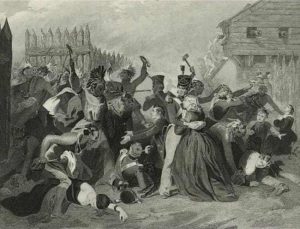 Most of us learned about Davy Crockett in school, but I don’t think that most of us really knew very much about him. Davy Crockett was an incredibly “macho” man. He was also an incredibly loyal man. During the War of 1812, the Creek Indian tribe split into factions. I suppose they thought to divide and conquer. One group, the Red Sticks, attacked Fort Mims on August 30, 1830, taking the lives of militiamen, civilians, and Creek allies. The Fort Mims massacre brought national outrage. Many men began to volunteer to fight the Creek Indians. Davy Crockett was among them. Crockett recalled, that he “had none of the dread of dying that I expected to feel,” but his wife, Mary “Polly” Finley did not share his optimism. She was terrified of losing her husband, and begged him not to go. Crockett felt obligated, and he did go. While he was off fighting, Polly became ill and passed away shortly after his return home. Crockett had 3 children with Polly…John Wesley, William, and Margaret.
Most of us learned about Davy Crockett in school, but I don’t think that most of us really knew very much about him. Davy Crockett was an incredibly “macho” man. He was also an incredibly loyal man. During the War of 1812, the Creek Indian tribe split into factions. I suppose they thought to divide and conquer. One group, the Red Sticks, attacked Fort Mims on August 30, 1830, taking the lives of militiamen, civilians, and Creek allies. The Fort Mims massacre brought national outrage. Many men began to volunteer to fight the Creek Indians. Davy Crockett was among them. Crockett recalled, that he “had none of the dread of dying that I expected to feel,” but his wife, Mary “Polly” Finley did not share his optimism. She was terrified of losing her husband, and begged him not to go. Crockett felt obligated, and he did go. While he was off fighting, Polly became ill and passed away shortly after his return home. Crockett had 3 children with Polly…John Wesley, William, and Margaret.
Losing Polly was very hard, but as often happened in those days, marriage after the loss of a wife came out of necessity. Davy needed someone to care for his children. He met a widow woman, Elizabeth Patton, who had children, and who lived nearby. Circumstances being what they were, Crockett began to visit the woman and after discovering his “company wasn’t at all disagreeable to her,” he decided he “could treat her children with so much friendship as to make her a good stepmother.” They married a short time later.
Crockett decided to move his family to Texas, but Elizabeth, while fine with that, asked that he go first to prepare things, and make sure he liked it there before they moved the family. It was probably a good thing in retrospect. Crockett arrived in East Texas in January 1836. He traveled through Nacogdoches and San Augustine before arriving in San Antonio. By the time he got there, the Texas Revolution was in full swing, and included thousands of Mexican troops led by Antonio López de Santa Anna. Their goal was to stop the Texas 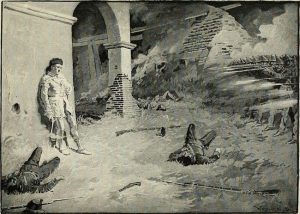 independence movement. The battle was fierce, and in the end, approximately 200 Texas militiamen were hunkered in at the Alamo when Santa Anna and his men arrived in February 1836. Crockett and the other men inside gathered supplies and did their best to prepare for the coming siege. Crockett was said to have helped with moral by making jokes and telling stories. The siege of the Alamo lasted 13 days, with the severely outnumbered Texans holding out until the walls of the compound were breached on March 6. As we all know, the men and women inside were all killed. Crockett was also killed, and that left Elizabeth widowed for a second time, but with more children this time. Still, by not taking the family, their lives were spared. Davy Crockett died at the age of 50 years.
independence movement. The battle was fierce, and in the end, approximately 200 Texas militiamen were hunkered in at the Alamo when Santa Anna and his men arrived in February 1836. Crockett and the other men inside gathered supplies and did their best to prepare for the coming siege. Crockett was said to have helped with moral by making jokes and telling stories. The siege of the Alamo lasted 13 days, with the severely outnumbered Texans holding out until the walls of the compound were breached on March 6. As we all know, the men and women inside were all killed. Crockett was also killed, and that left Elizabeth widowed for a second time, but with more children this time. Still, by not taking the family, their lives were spared. Davy Crockett died at the age of 50 years.
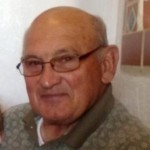
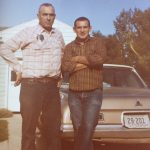 A number of years passed between the first time I met Uncle Butch Schulenberg, who is my father-in-law, Walt Schulenberg’s half-brother, and the reconnecting we had to him after my father-in-law’s passing. I consider those years a great loss, but I am thankful to have him back in our lives. There was no falling out or anything, just a lack of getting together, which is why I consider it such a great loss. It didn’t have to take that long. Uncle Butch is such a wonderful person, and I enjoy his company, and that of his lovely wife, Charlys very much.
A number of years passed between the first time I met Uncle Butch Schulenberg, who is my father-in-law, Walt Schulenberg’s half-brother, and the reconnecting we had to him after my father-in-law’s passing. I consider those years a great loss, but I am thankful to have him back in our lives. There was no falling out or anything, just a lack of getting together, which is why I consider it such a great loss. It didn’t have to take that long. Uncle Butch is such a wonderful person, and I enjoy his company, and that of his lovely wife, Charlys very much.
Butch is a great teller of stories, and I mean the kind I love to hear…family history. The best place to get those family history accounts, is from someone who lived them. Growing up the son of the local sheriff, I don’t know if Uncle Butch had to be good so his dad didn’t get after him for embarrassing him, or if he was one of those who got into a bit of trouble because he knew that his dad could get him out of it. I might have to guess that it 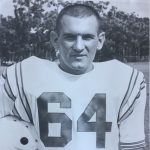 was a little bit of both, because I think that Uncle Butch has a mischievous side to him. I don’t think he was ever really bad, but as we all know, boys will be boys, so at least as a kid, my guess is that he tried to find out what his limits were.
was a little bit of both, because I think that Uncle Butch has a mischievous side to him. I don’t think he was ever really bad, but as we all know, boys will be boys, so at least as a kid, my guess is that he tried to find out what his limits were.
By the time he got into high school, Butch had discovered football, and that proved to be a great part of his school years. Lots of guys love to play, watch, eat, and sleep football, so to get to be part of the team is a cool thing. Uncle Butch was a good athlete, and was often talked about or written about in the local paper. He still loves all the local sports in Forsyth, Montana where he lived then, and still lives. He is probably one of their greatest boosters, and he knows the local talent personally, because it is a small town, so everyone knows everyone else. He is able to see their athletic growth, and knows the local teams’ stats. That’s what being a booster is all about. It’s one thing to cheer for a team, because they are the local kids, and another to know just how good the local kids are. The kids and the townspeople love Uncle Butch too, because he is a friendly guy who can always be counted on to lend a helping hand, or just to shoot the breeze. Uncle Butch is well liked, because he is so friendly.
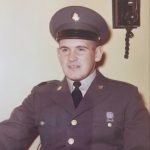
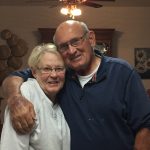
While Butch did live away from Forsyth for a short time, mostly while he was in the service, he has always been a local boy. He was born in Forsyth on November 9, 1940 to Andrew and Barbara (Fadhl) Schulenberg, and Forsyth would truly always be his home. Today is Uncle Butch’s 79th birthday. He doesn’t seem a day over 60 if you ask me. I think he’s a kid at heart and always will be. I will always treasure him. Happy 79th birthday Uncle Butch!! Have a great day!! We love you!!
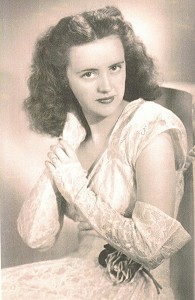
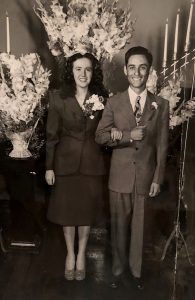 From the moment he first saw her, my future uncle, George Hushman, knew that Evelyn Byer was the girl for him. He was taken by her beauty, and he never had eyes for another…nor did she. Theirs was a match made in Heaven. They married on September 1, 1947, and they would go on to celebrate 67 years of marriage together. Her passing on May 4, 2015 was the saddest day of his life.
From the moment he first saw her, my future uncle, George Hushman, knew that Evelyn Byer was the girl for him. He was taken by her beauty, and he never had eyes for another…nor did she. Theirs was a match made in Heaven. They married on September 1, 1947, and they would go on to celebrate 67 years of marriage together. Her passing on May 4, 2015 was the saddest day of his life.
Aunt Evelyn and Uncle George decided to build a house for their family soon after their marriage. They, with the help of family members built the iconic house that stood next to the Mills Fire Station ever since. Everyone in town knew the beautiful house. Until Uncle George’s passing, they would be the only family ever to live there. That is a sad thought to me, but some things cannot be helped. A home is meant to be lived in, not held as a shrine to it’s builder.
Aunt Evelyn and Uncle George would be blessed with five beautiful children, Susie Young, George Hushman, Shelley Campbell, Shannon Limmer, and Gregory Hushman. They would also be blessed with grandchildren, 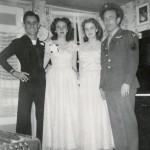 great grandchildren, and great great grandchildren, who are too numerous to name here. I have been blessed to be a niece to my aunt and uncle, as ar so many other nieces and nephews. Aunt Evelyn has always had a generous spirit, and many of us credit her with making our weddings perfect, by making the perfect wedding cake.
great grandchildren, and great great grandchildren, who are too numerous to name here. I have been blessed to be a niece to my aunt and uncle, as ar so many other nieces and nephews. Aunt Evelyn has always had a generous spirit, and many of us credit her with making our weddings perfect, by making the perfect wedding cake.
For years, Aunt Evelyn and Uncle George bowled as teammates to my parents, Allen and Collene Spencer (Evelyn and Collene being sisters). They had often double dated years ago, so bowling together was a logical next step. When the team decided they didn’t want to bowl any longer, Aunt Evelyn continued on by getting a team of some of her daughters together. I had the pleasure of being a substitute for them, whenever they needed one. We always had a great time. Those were really great days, and I miss them very much. We were 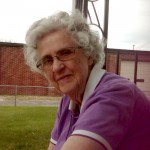
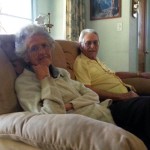 close, and enjoyed each other’s company. There was lots of laughter and fun, every week. Time goes by so quickly, and before we knew it, we were saying goodbye to Aunt Evelyn and then, Uncle George. As it was with my parents, aunts, and uncles before them, we find ourselves losing all the elders in our family, and I find that very sad, because they were in great respect the glue that held us all together. Today would have been Aunt Evelyn’s 91st birthday. Happy birthday in Heaven, Aunt Evelyn. We love and miss you very much.
close, and enjoyed each other’s company. There was lots of laughter and fun, every week. Time goes by so quickly, and before we knew it, we were saying goodbye to Aunt Evelyn and then, Uncle George. As it was with my parents, aunts, and uncles before them, we find ourselves losing all the elders in our family, and I find that very sad, because they were in great respect the glue that held us all together. Today would have been Aunt Evelyn’s 91st birthday. Happy birthday in Heaven, Aunt Evelyn. We love and miss you very much.
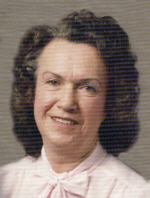
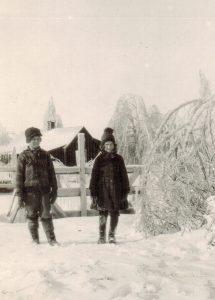 My Aunt Ruth Wolfe was the youngest of the four children of my grandparents, Allen and Anna Spencer. She was born on November 9, 1925 in Duluth, Minnesota. Strange to think that 31 years later, she would get a niece…me, who would be so much like her…in some ways that is. My Aunt Ruth was a very talented woman. She could play any instrument that was set before her, she could paint and do crafts, she loved horses and even raced them, and of course, she was an animal lover…all animals.
My Aunt Ruth Wolfe was the youngest of the four children of my grandparents, Allen and Anna Spencer. She was born on November 9, 1925 in Duluth, Minnesota. Strange to think that 31 years later, she would get a niece…me, who would be so much like her…in some ways that is. My Aunt Ruth was a very talented woman. She could play any instrument that was set before her, she could paint and do crafts, she loved horses and even raced them, and of course, she was an animal lover…all animals.
Aunt Ruth was never really one to want to settle in one place for very long…until she and Uncle Jim moved to the Spokane area, that is. Once they bought their mountain top outside of Newport, Washington, she knew she was home. The family built three cabins on the mountain top, one for Aunt Ruth and Uncle Jim; one for their daughter Shirley Cameron and her husband Shorty; and one for their son, Terry Wolfe. The beauty of the mountain lulled them into a quiet, peaceful life, far away from the hustle and bustle of the California area they had left behind after losing their son, Larry Wolfe to an accidental explosion. Nothing would bring him back, of course, but the peace of the mountain top helped to heal their wounded hearts.
Aunt Ruth and Uncle Jim, while very much at home on their mountain top, never lost their love of the open road, and often took trips to several location, including Casper, Wyoming to visit my family, her brother, Allen Spencer; sister-in-law, Collene; and daughters, Cheryl Masterson, Caryn Schulenberg, Caryl Reed, Alena 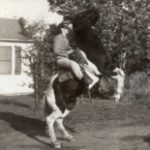
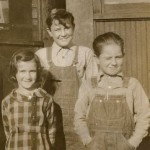 Stevens, and Allyn Hadlock. We loved those visits. Aunt Ruth and Uncle Jim were always lots of fun, and having them in town again was a great treat. They had lived in the Casper area years before, and we were all very sad to see them move away. Those wonderful visits were cut short when Aunt Ruth became ill, and she passed away on May 11, 1992 of Cancer. Today would have been Aunt Ruth’s 94th birthday. Happy birthday in Heaven Aunt Ruth, I know you’re having a great celebration with all the loved ones who have now joined you there. We love and miss you very much.
Stevens, and Allyn Hadlock. We loved those visits. Aunt Ruth and Uncle Jim were always lots of fun, and having them in town again was a great treat. They had lived in the Casper area years before, and we were all very sad to see them move away. Those wonderful visits were cut short when Aunt Ruth became ill, and she passed away on May 11, 1992 of Cancer. Today would have been Aunt Ruth’s 94th birthday. Happy birthday in Heaven Aunt Ruth, I know you’re having a great celebration with all the loved ones who have now joined you there. We love and miss you very much.
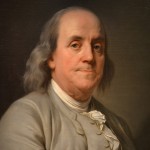
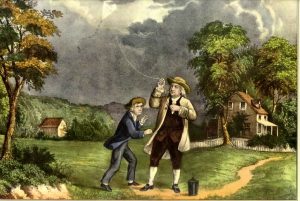 Most people think of Benjamin Franklin as the man who discovered electricity, and they would be right, but there was really so much more to the man that just that. While we think of Ben Franklin as a genius, and he was, he only had two years of actual schooling. After that, he quit school to help his family make soap and candles, and later, joined his brother, James as an indentured apprentice at a printing shop when he was twelve. This led to an obsession for books. Franklin loved the written word, and spent much of the little money he made to buy books. Because of his love of books, he became known as an author, printer, politician, postmaster, scientist, inventor, activist, statesman, and diplomat…all of it self taught.
Most people think of Benjamin Franklin as the man who discovered electricity, and they would be right, but there was really so much more to the man that just that. While we think of Ben Franklin as a genius, and he was, he only had two years of actual schooling. After that, he quit school to help his family make soap and candles, and later, joined his brother, James as an indentured apprentice at a printing shop when he was twelve. This led to an obsession for books. Franklin loved the written word, and spent much of the little money he made to buy books. Because of his love of books, he became known as an author, printer, politician, postmaster, scientist, inventor, activist, statesman, and diplomat…all of it self taught.
While much of Ben Franklin’s life was centered around serious accomplishments, he also had a human side. There were things that he felt strongly about. He left 2,000 pounds of sterling silver to Boston and Philadelphia, with the stipulation that the money be held for 100 years, and then a small percentage could be used for loans for local tradesmen. After that, the rest was to be saved for another 100 years. The rest of the funds were used to build the Franklin Institute in Philadelphia, and the Benjamin Franklin Institute of Technology in Boston. I’m not sure that was exactly what he wanted done with that balance, but it is a nice way to honor his memory.
Ben Franklin believed in the importance of fire prevention, and created the first volunteer fire department in 1736 called the Union Fire Company. Because he created it, the company was often called Benjamin Franklin’s Bucket Brigade. He also loved swimming, and he was a bit of an inventor there too. As a child, he used a kite to skim across the water, and he invented a pair of hand paddles that he used to navigate the Charles River. He was given an honorary induction in the International Swimming Hall of Fame.
All that is interesting, but to me one of his coolest accomplishments was the Glass Armonica. You might be wondering what that is, but if you have ever played a water glass with a damp finger, you would have a pretty 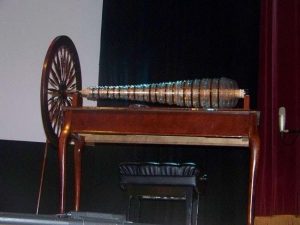
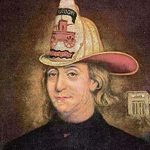 good idea how to play the Glass Armonica. Debuted in 1761, it was beautifully engineered with blown glass bowls. To play it, you simply wet your fingers and touched the various bowls to get a variety of sounds. The instrument was so popular that Beethoven and Mozart began creating music for it. Unfortunately the novelty wore off after a time, and that is why most people don’t even know what it is today. Ben Franklin was a man of many talents, and yet all we ever really thought about was the discovery of electricity.
good idea how to play the Glass Armonica. Debuted in 1761, it was beautifully engineered with blown glass bowls. To play it, you simply wet your fingers and touched the various bowls to get a variety of sounds. The instrument was so popular that Beethoven and Mozart began creating music for it. Unfortunately the novelty wore off after a time, and that is why most people don’t even know what it is today. Ben Franklin was a man of many talents, and yet all we ever really thought about was the discovery of electricity.
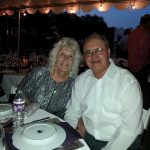 Birthdays are supposed to be happy events, and most are, but the birthdays that come after someone has passed away can be some of the hardest days we will ever spend. Losing a loved one leaves the family with nothing but empty space and memories. The place our loved one once filled with their presence, is now filled only with memories of someone who was, and still is, so important to us. Each first, as it arrives makes the emptiness even more pronounced. The first holiday, birthday, family dinner, or even just the mundane tasks they always helped with, are among the worst days of our new reality, but I think it is the first of those events that will always be viewed as the worst.
Birthdays are supposed to be happy events, and most are, but the birthdays that come after someone has passed away can be some of the hardest days we will ever spend. Losing a loved one leaves the family with nothing but empty space and memories. The place our loved one once filled with their presence, is now filled only with memories of someone who was, and still is, so important to us. Each first, as it arrives makes the emptiness even more pronounced. The first holiday, birthday, family dinner, or even just the mundane tasks they always helped with, are among the worst days of our new reality, but I think it is the first of those events that will always be viewed as the worst.
On October 16, 2019, our uncle, Eddie Hein had a heart attack while working in his 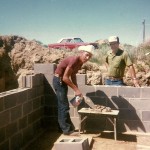 yard. Friends and neighbors, as will as his wife, Pearl and their grandson, Dalton, all tried to help, but it was too late. Eddie was gone, but his memory will be with his many friends and family members forever. Eddie was a sweet man with a heart of gold, who was always willing to help those in need. The people of Forsyth, Montana knew Eddie well. He was a friend to all. He would wave as he drove by, and help when it was needed. Eddie was known around town as someone who could always be counted on, no matter what the need. He was there to give a smile, a hug, a wave, or a hand. Someone said that Eddie was one of God’s great ones, and I agree.
yard. Friends and neighbors, as will as his wife, Pearl and their grandson, Dalton, all tried to help, but it was too late. Eddie was gone, but his memory will be with his many friends and family members forever. Eddie was a sweet man with a heart of gold, who was always willing to help those in need. The people of Forsyth, Montana knew Eddie well. He was a friend to all. He would wave as he drove by, and help when it was needed. Eddie was known around town as someone who could always be counted on, no matter what the need. He was there to give a smile, a hug, a wave, or a hand. Someone said that Eddie was one of God’s great ones, and I agree.
Eddie loved vintage cars, and had his own 55 Chevy that he thoroughly enjoyed. It wasn’t just the cars either, 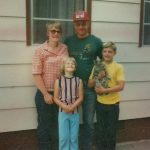 because he loved old tractors too. Eddie loved living next to the Yellowstone River. It was almost like living in the country, and it gave them enough room to have their garden. Eddie could fix just about anything. He loved tinkering around in his shop. If you needed a part for something, there was a good chance that Eddie had it or could make it. He was a great carpenter, and could help build just about anything. Eddie was a bit of a Jock of all trades, and the people of Forsyth counted on him for many things. That is a big part of what makes his passing so sad for everyone, and the only consolation is that since Eddie was a Christian man, we know that we will see him again soon. Happy first Heavenly Birthday Eddie. We love and miss you very much.
because he loved old tractors too. Eddie loved living next to the Yellowstone River. It was almost like living in the country, and it gave them enough room to have their garden. Eddie could fix just about anything. He loved tinkering around in his shop. If you needed a part for something, there was a good chance that Eddie had it or could make it. He was a great carpenter, and could help build just about anything. Eddie was a bit of a Jock of all trades, and the people of Forsyth counted on him for many things. That is a big part of what makes his passing so sad for everyone, and the only consolation is that since Eddie was a Christian man, we know that we will see him again soon. Happy first Heavenly Birthday Eddie. We love and miss you very much.
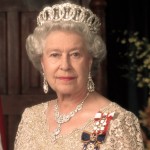
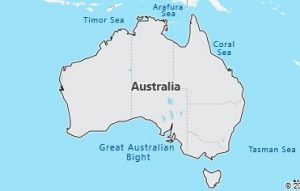 As nations grow in size, population, or power, many no longer want to be under the rule of another nation, even one that helped get them to where they are, and even one that has owned their land for years. It is something we, as Americans can’t really fathom, considering that we fought the Revolutionary War to leave British rule.
As nations grow in size, population, or power, many no longer want to be under the rule of another nation, even one that helped get them to where they are, and even one that has owned their land for years. It is something we, as Americans can’t really fathom, considering that we fought the Revolutionary War to leave British rule.
The decision was very different for Australia on November 6, 1999. Treasurer Wayne Swan and senior opposition figure Malcolm Turnbull, who once was Australia’s Republican Movement president, came together in the capital Canberra on the prior Monday to launch a book of essays called ‘Project Republic: Plans and Arguments for a New Australia’. Mr Turnbull, who sits on the front bench for the conservative opposition, described this latest push as “simply, purely patriotic” and called for an ‘interactive plebiscite’ to use cyberspace to better inform Australians of the issues surrounding constitutional change.
As it was, many feared the change, and the work and uncertainty that could accompany it. Still others, like being a part of the monarchy. “Many argue that the sexy celebrity status of William and Kate will sweep all before it and their star quality will revive the monarchy in Australia. I don’t think so,” Turnbull writes. “They will certainly be far more interesting and telegenic than Charles and Camilla – but I am not convinced that will translate into enhanced support for William (or indeed Charles) remaining our head of state.” His opinions aside, the people of Australia voted and decided that they just weren’t ready, and quite possibly they never would be ready to walk away from the British Monarchy. That actually happened in America too, because while 
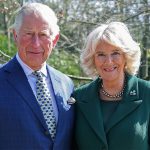 the overwhelming number of citizens wanted to go for independence, there were those who did not.
the overwhelming number of citizens wanted to go for independence, there were those who did not.
In Australia, it didn’t appear that the situation would have come to war, as it had in America, but one never really knows what can trigger a war of this type. I guess that in the case of Australia, if they are tired of the Queens rule, they have chosen to wait and see what the future ruling parties might bring. If they don’t like the outcome, they could always choose to break away at a later date.
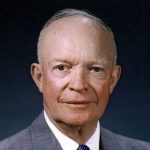 Every four years, Americans go to the polls to elect a new president. Looking at the first time that a president is elected, quite often, we know little about the person running for president. Even if they have been in Congress, it takes some digging to really discover who they are, and what they can do for our nation. We rely on things like the political party they belong to or the campaign promises they make. Still, we have no idea what the candidate will really do, until they are in office.
Every four years, Americans go to the polls to elect a new president. Looking at the first time that a president is elected, quite often, we know little about the person running for president. Even if they have been in Congress, it takes some digging to really discover who they are, and what they can do for our nation. We rely on things like the political party they belong to or the campaign promises they make. Still, we have no idea what the candidate will really do, until they are in office.
Sometimes, there are exceptions to that basic rule, however. Such was the case with Dwight D Eisenhower, who was the supreme commander of Allied forces in Western Europe during World War II. Of course, running a nation is not the same as running a war, unless the nation happens to be at war, that is. Nevertheless, a commander who excelled at leading a war, was by definition, a leader…making it a good bet that he could also lead a nation. Eisenhower was that kind of leader, and the people of the United States could see it clearly. He led the massive invasion of Nazi-occupied Europe that began on D-Day…June 6, 1944. Then in 1952, with victory under his belt, leading Republicans convinced Eisenhower, who by then was in command of NATO forces in Europe, to run for president. As the campaign progressed, it would remain to be seen, just how much the people of the United States thought that he would make a good leader for the nation. The election would be the telling point.
And so it went. Eisenhower won a convincing victory over Democrat Adlai Stevenson and would serve two terms in the White House (1953-1961). Even more amazing than his victory was the fact that General Dwight D Eisenhower won the American presidential elections with the largest number of popular votes ever recorded for a presidential candidate. It was a landslide victory. The people had spoken. Also of note, is that Eisenhower was the only other president to win the presidential election, having never served in any other political office. I’m sure everyone knows that the other president to do that is our current president…Donald Trump. That is an almost unheard of feat. A general and a businessman, both of whom had not been politically inclined, and yet, here they were. During his presidency, Eisenhower managed Cold War-era tensions with the Soviet Union under the looming threat of nuclear weapons, ended the war in Korea in 1953 and authorized a number of covert anti-communist operations by the CIA around the world. Here at home, America was in a period of relative prosperity, nevertheless, Eisenhower strengthened Social Security and created the massive new Interstate Highway System. Eisenhower was so well liked that he would beat Stevenson again four years later in a landslide to win re-election, despite health concerns after suffering a heart attack in 1955.
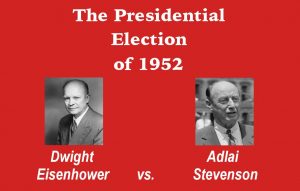
Eisenhower was born in Denison, Texas, on October 14, 1890. He grew up in Abilene, Kansas, as the third of seven sons in a poor family. His mother, a devout Mennonite and pacifist, was quite distressed when young Ike…as he was known…won an appointment to the US Military Academy at West Point, New York. Nevertheless, he went on to graduate in the middle of his class in 1915. While stationed as a second lieutenant in San Antonio, Texas, Eisenhower met Mamie Geneva Doud. The couple married in 1916 and had two sons, Doud Dwight, who died of scarlet fever as a small child, and John. World War I ended just before Eisenhower was scheduled to go to Europe, which was frustrating to the young officer, but he soon managed to acquire an appointment to the Command and General Staff College at Fort Leavenworth, Kansas. Graduating first in his class of 245, he served as a military aide to General John J Pershing, commander of US forces during World War I, and later to General Douglas MacArthur, US Army chief of staff. During his seven years serving under MacArthur, Eisenhower was stationed in the Philippines from 1935 to 1939.
Eisenhower returned soon after Nazi Germany’s invasion of Poland sparked the outbreak of World War II in Europe. In September 1941, he received his first general’s star with a promotion to brigadier general. After Japan attacked Pearl Harbor that December, US Army Chief of Staff General George C Marshall called Eisenhower to Washington, DC to work as a planning officer. Beginning in November 1942, Eisenhower headed Operation Torch, the successful Allied invasion of North Africa. He then directed the amphibious invasion of Sicily and the Italian mainland in 1943 that led to the fall of Rome in June 1944. In early 1943, he was made a full general. Eisenhower was appointed supreme commander of the Allied Expeditionary Force in December of that year and given the responsibility of spearheading the planned Allied invasion of Nazi-occupied Europe. On D-Day…June 6, 1944, more than 150,000 Allied forces crossed the English Channel and stormed the beaches of Normandy. The invasion led to the liberation of Paris on August 25 and turned the tide of the war in Europe decisively in the Allied direction. Having risen from lieutenant colonel in the Philippines to supreme commander of the victorious forces in Europe in only five years, Eisenhower returned home to a hero’s welcome in 1945 to serve as chief of staff of the US Army.
In 1948, Eisenhower left active duty and became president of New York City’s Columbia University. His brief 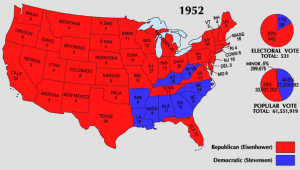 return to civilian life ended in 1950, however, when President Harry S Truman asked him to take command of the new North Atlantic Treaty Organization (NATO) forces in Europe. In that position, Eisenhower worked to create a unified military organization that would combat potential communist aggression around the globe. As President of the United States, while weathering criticism from both left and right, Eisenhower enjoyed high approval ratings throughout his administration. After leaving office in January 1961, he retired to his farm in Gettysburg, Pennsylvania. He worked largely on his memoirs, and would publish several books over the following years. He died on March 28, 1969, after a long illness.
return to civilian life ended in 1950, however, when President Harry S Truman asked him to take command of the new North Atlantic Treaty Organization (NATO) forces in Europe. In that position, Eisenhower worked to create a unified military organization that would combat potential communist aggression around the globe. As President of the United States, while weathering criticism from both left and right, Eisenhower enjoyed high approval ratings throughout his administration. After leaving office in January 1961, he retired to his farm in Gettysburg, Pennsylvania. He worked largely on his memoirs, and would publish several books over the following years. He died on March 28, 1969, after a long illness.

